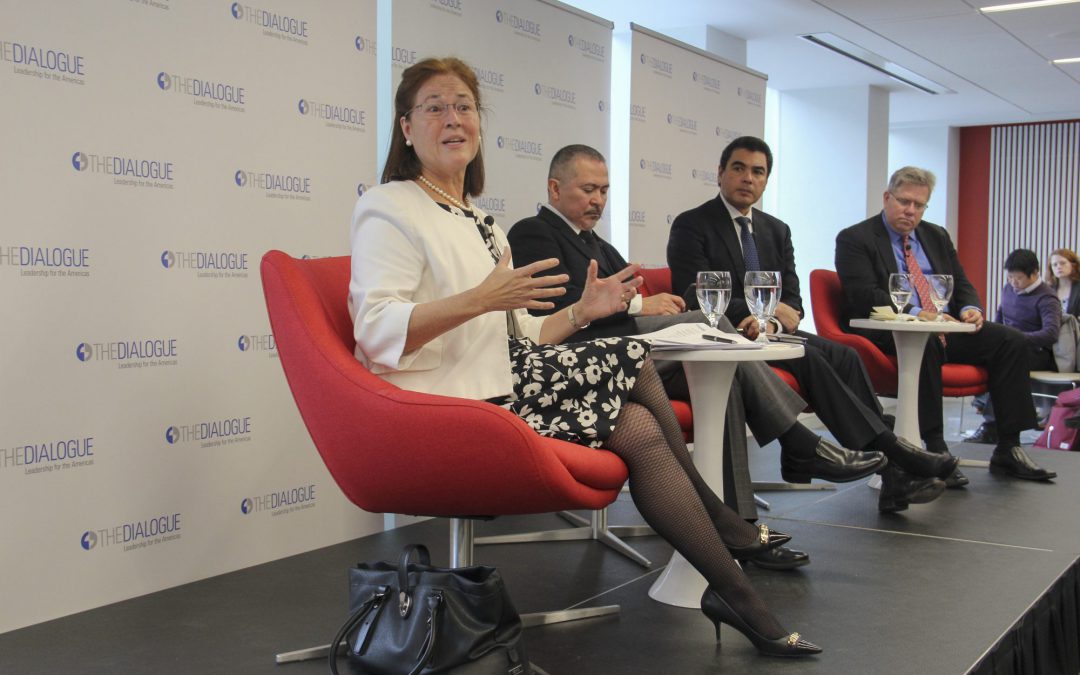WASHINGTON – Ending a program that provides temporary legal immigration status for Salvadorans could have massive economic impacts on the U.S., immigration experts and advocates said Wednesday.
“We have had a fruitful and very close relationship with the U.S. in the past, and we are grateful for that,” said Maria Eugenia Brizuela de Avila, a former Salvadoran foreign minister, at a discussion hosted by the Inter-American Dialogue.
Sending back Temporary Protected Status recipients who have been effectively integrated into American society would harm El Salvador as well, said Brizuela de Avila, citing the country’s low economic growth, high rates of homicide and ongoing gang violence as primary concerns.
The latest in a series of immigration program rollbacks, El Salvador is the fourth country for which the Trump administration has ended the TPS program for in the past year, following Haiti, Nicaragua and Honduras. The program allows immigrants to live and work legally in the U.S. following natural disasters or war in their home countries that make it unsafe for them to return. According to the Center for Migration Studies, Salvadorans comprise 195,000 of the estimated 325,000 total TPS beneficiaries, making them the largest group of migrants protected under the program.
The fate of TPS beneficiaries is dire, but advocates are holding out hope for immigration reform efforts on Capitol Hill this week. While the legislative debates will focus on major issues such as the proposed construction of a border wall and a deal deciding the fate of the “dreamers”, Salvadorans hope that there is a chance that less prominent issues, such as extending TPS, could be factored into the talks.
To make their case, advocates stress the contribution that TPS holders make to the American economy. “It would not really benefit either country’s economy to send back the TPS holders,” Brizuela de Avila said. “Returnees with children who are U.S. citizens would also be in danger of becoming victims of extortion or recruitment upon return by gangs, so we don’t want to them in that position.”
Roberto López, vice president of Salvadoran American Chamber of Commerce argued that there’s really nothing temporary about TPS except its name, pointing to the fact that the majority of Salvadoran TPS recipients have been living and working in the U.S. since 2001, when a pair of earthquakes devastated their country.
“So far, the program has been renewed every 18 months, allowing people to cement their lives here and start families,” López said. “These very real people who are at risk of losing their right to live in this country are your best friends, roommates and co-workers so it doesn’t make any sense to just get rid of them.”
Panelists also discussed the implications that stripping TPS holders of their status would have on the U.S. GDP, which includes nearly $3.1 billion in contributions from Salvadoran immigrants annually. Andrew Selee, president of the Migration Policy Institute, said that eliminating TPS would effectively put contributions by Salvadoran taxpayers into the informal or “illegal” economy, meaning that they would neither be taxed nor count toward the total GDP of the country.
“Salvadoran immigrants are almost entirely integrated into the formal economy, and are incredibly productive with very high labor participation rates,” Selee said. “If you look at sectors like construction, 20 percent of Salvadorans with TPS work there compared to only 4 percent of American citizens. If TPS holders are forced to leave, there’s going to be a large gap in the labor force that will need to be covered quickly.”
As of now, Salvadoran TPS holders have until September 2019 to find a way to obtain permanent status or risk being deported back to El Salvador. Executive Director of the immigration advocacy group Alianza Americas Oscar Chacón called on Congress during the panel to work toward providing these immigrants with legal mechanisms to be able to stay amid the repeal.
“No matter how American you’ve become, or what roots you’ve laid down here, there simply isn’t a foolproof transition for you to remain in this country without losing immigration status altogether,” he said. “Salvadorans on TPS were not planning on going back and they will try to stay here in any way they can.”

